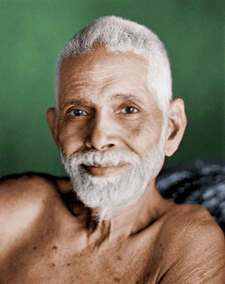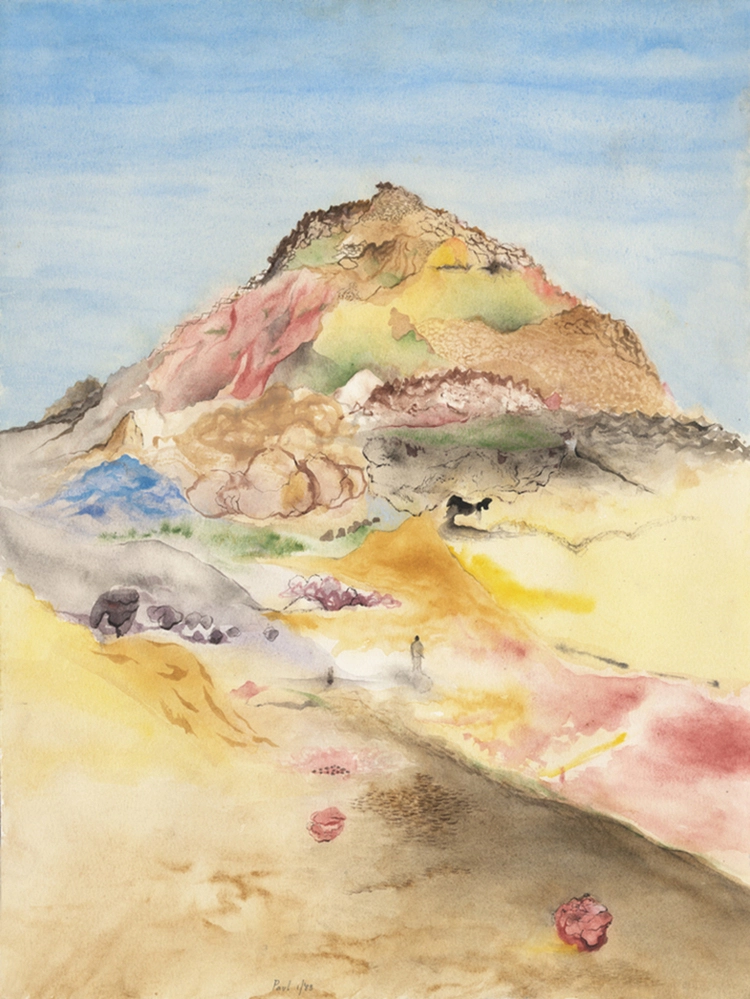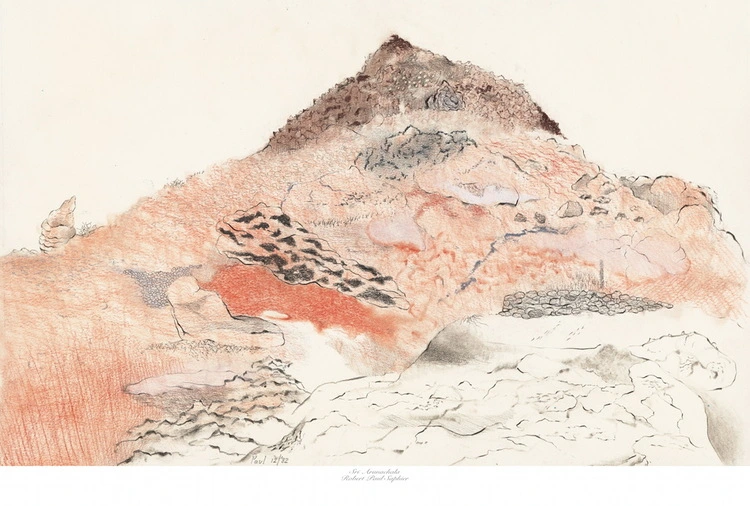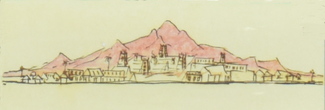Happiness
Sri Bhagavan was questioned often by sincere devotees about the nature of true, lasting happiness and the means to obtain it. His replies shed light on the nature and cause of happiness and dissolved long cherished and strongly held (though erroneous) ideas of the same. The following excerpts from Talks with Sri Ramana Maharshi (found in Volume 6 of the seven volume set Arunachala Ramana Eternal Ocean of Grace), highlight the nature of true happiness which is experienced by everyone daily in the state of deep sleep when one is devoid of all possessions, including the body.
As all living beings desire to be happy always, without misery, as in the case of everyone there is observed supreme love for one’s Self, and as happiness alone is the cause for love, to gain that happiness which is one’s nature and which is experienced in the state of deep sleep where there is no mind, one should know one’s Self. For that, the path of knowledge, the inquiry of the form “Who am I?”, is the principal means.
– “Who am I?”
Talk 3
A question was asked as to the nature of happiness.
M.: If a man thinks that his happiness is due to external causes and his possessions, it is reasonable to conclude that his happiness must increase with the increase of possessions and diminish in proportion to their diminution. Therefore if he is devoid of possessions, his happiness should be nil. What is the real experience of man? Does it conform to this view? In deep sleep the man is devoid of possessions, including his own body. Instead of being unhappy he is quite happy. Everyone desires to sleep soundly. The conclusion is that happiness is inherent in man and is not due to external causes. One must realise his Self in order to open the store of unalloyed happiness.
Talk 20
A man is possessed of limited powers and is miserable; he wants to expand his powers so that he may be happy. But consider if it will be so; if with limited perceptions one is miserable, with extended perceptions the misery must increase proportionately. Occult powers will not bring happiness to anyone, but will make him all the more miserable! Moreover what are these powers for? The would-be occultist (siddha) desires to display the siddhis so that others may appreciate him. He seeks appreciation, and if it is not forthcoming he will not be happy. There must be others to appreciate him. He may even find another possessor of higher powers. That will cause jealousy and breed unhappiness. The higher occultist (siddha) may meet a still higher siddha and so on until there will come one who will blow up everything in a trice. Such is the highest adept (siddha) and He is God or the Self. Which is the real power? Is it to increase prosperity or bring about peace? That which results in peace is the highest perfection (siddhi).
Talk 25
Again, passions are attended with irregular breathing, whereas calm and happiness are attended with slow and regular breathing. Paroxysm of joy is in fact as painful as one of pain, and both are accompanied by ruffled breaths. Real peace is happiness. Pleasures do not form happiness.
Talk 28
D.: What is happiness? Is it inhering in the Atman or in the object, or in the contact between the subject and the object? But we do not see happiness in our affairs. When does it actually arise?
M.: When there is contact of a desirable sort or memory thereof, and when there is freedom from undesirable contacts or memory thereof, we say there is happiness. Such happiness is relative and is better called pleasure. But men want absolute and permanent happiness. This does not reside in objects, but in the absolute. It is peace free from pain and pleasure – it is a neutral state.
D.: In what sense is happiness our real nature?
M.: Perfect bliss is Brahman. Perfect peace is of the Self. That alone exists and is conscious. The same conclusion is arrived at: (a) judged metaphysically, and (b) inferred by bhakti marga (path of devotion). We pray to God for bliss and receive it by grace. The bestower of bliss must be bliss itself and also infinite. Therefore, Iswara is the personal god of infinite power and bliss. Brahman is bliss, impersonal and absolute. The finite egos, deriving their source from Brahman and then Iswara, are in their spiritual nature bliss only. Biologically, an organism functions because such functions are attended with happiness. It is pleasure that helps our growth; food, exercise, rest, and gregarious qualities. The psychology (and metaphysics) of pleasure is perhaps this – our nature is primarily one, entire, blissful. Take this as a probable hypothesis. Creation is by the entire Godhead breaking into God and nature (maya or prakriti). This maya is of two parts: para (the supporting essence) and apara (the five elements, mind, intellect, and ego (eight-fold). Ego’s perfection is suddenly broken at a point and a want is felt giving rise to a desire to get something or do something. When that want is cured by the fulfilment of that desire, the ego is happy and the original perfection is restored. Therefore, happiness may be said to be our natural condition or nature. Pleasure and pain are relative and refer to our finite state, with progress by satisfaction of want. If relative progress is stopped and the soul merges into Brahman, of the nature of perfect peace, that soul ceases to have relative, temporary pleasure and enjoys perfect peace – bliss. Hence Self-realisation is bliss; it is realising the Self as the limitless spiritual eye (jnana dristi) and not clairvoyance; it is the highest self-surrender. Samsara (the world-cycle) is sorrow.
Talk 63
The fact is that the man considers himself limited and there arises the trouble. The idea is wrong. He can see it for himself. In sleep there was no world, no ego (no limited self), and no trouble. Something wakes up from that happy state and says ‘I’. To that ego the world appears. Being a speck in the world he wants more and gets into trouble. How happy he was before the rising of the ego! Only the rise of the ego is the cause of the present trouble. Let him trace the ego to its source and he will reach that undifferentiated happy state which is sleepless sleep. The Self remains ever the same, here and now. There is nothing more to be gained. Because the limitations have wrongly been assumed there is the need to transcend them. It is like the ten ignorant fools who forded a stream and on reaching the other shore counted themselves to be nine only. They grew anxious and grieved over the loss of the unknown tenth man. A wayfarer, on ascertaining the cause of their grief, counted them all and found them to be ten. But each one of them had counted the others leaving himself out. The wayfarer gave each in succession a blow telling them to count the blows. They counted ten and were satisfied. The moral is that the tenth man was not got anew. He was all along there, but ignorance caused grief to all of them. Again, a woman wore a necklace round her neck but forgot it. She began to search for it and made enquiries. A friend of hers, finding out what she was looking for, pointed out the necklace round the seeker’s neck. She felt it with her hands and was happy. Did she get the necklace anew? Here again ignorance caused grief and knowledge happiness. Similarly also with the man and the Self. There is nothing to be gained anew. Ignorance of the Self is the cause of the present misery; knowledge of the Self brings about happiness.
Maharshi added: In dreamless sleep, there is no world, no ego and no unhappiness. But the Self remains. In the waking state there are all these; yet there is the Self. One has only to remove the transitory happenings in order to realise the ever-present beatitude of the Self. Your nature is bliss. Find that on which all the rest are superimposed and you then remain as the pure Self.
Talk 192
Maharshi explained in the course of conversation: Whoever desires liberation? Everyone wants only happiness – happiness too as found in the enjoyment of the senses. This question was asked of a guru, and the latter answered: “Quite so. That happiness which is the result of enjoyment by the senses is the same as that of liberation. That desire of such liberation is one of the four qualifications for attainment. This is common to all. So all are eligible for this knowledge – Self-knowledge.”
Talk 203
(to a gentleman whose wife had died:)
The experience of deep sleep clearly teaches that happiness consists in being without the body. The wise also confirm it, speaking of liberation after the body is given up. Thus the sage is awaiting the casting off of the body. Just as a labourer carrying a load on his head for the sake of wages bears the burden with no pleasure, carries it to the destination, and finally unburdens himself with relief and joy, so also the sage bears this body, awaiting the right and destined time to discard it. If now you are relieved of one half of the burden, i.e., the wife, should you not be thankful and be happy for it? Nevertheless you cannot be so because of your physical outlook.
Even men who ought to know better and who have known the teaching about liberation after death etc., glorify liberation along with the body and call it some mysterious power of keeping the body eternally alive!
There will be no pain if the physical outlook is given up and if the person exists as the Self. Mourning is not the index of true love. It betrays love of the object, of its shape only. That is not love. True love is shown by the certainty that the object of love is in the Self and that it can never become nonexistent. (Maharshi cited the story of Ahalya and Indra from Yoga Vasishta in this connection.)
Still it is true, pain on such occasions can only be assuaged by association with the wise.
Talk 207
Deep sleep is only the state of non-duality. Can the difference between the individual and Universal souls persist there? Sleep implies forgetfulness of all differences. This alone constitutes happiness. See how carefully people prepare their beds to gain that happiness. Soft cushions, pillows and all the rest are meant to induce sound sleep, that is to say to end wakefulness. And yet the soft bed, etc., are of no use in the state of deep sleep itself. The implication is that all efforts are meant only to end ignorance. They have no use after realisation.
Talk 225
When Sri Bhagavan and Rangaswami, an attendant, were on the rocks, Bhagavan noticed someone in the Ashram rocking in a rocking chair, and remarked to the attendant: “Siva made over all his own possessions to Vishnu and wandered away in the forests and wilderness and cemeteries and lived on food begged by him. In his view non-possession is higher in the scale of happiness than possession of things.”
D.: What is that higher happiness?
M.: To be free from anxieties. Possessions create anxieties such as their safeguarding, their utilisation, etc. Nonpossession does not bring any anxieties in its train. Therefore Siva resigned everything in favour of Vishnu and He himself went away happy. Divestment of possessions is the highest happiness.
The Ever-Flowing Grace of Sri Arunachala
Now advanced in years, I often find myself walking into a room, pleasantly surprised to see a painting of the sacred mountain Arunachala by my late husband, Paul Saphier. In fact, it just happened this evening in the basement of Sri Arunachala-Ramana Mandiram in Nova Scotia, Canada.
The painting in the Ashrama temple basement shows a small figure ascending the Hill — one must look closely to see it! Many years back, Paul recorded a dream in which he found himself ascending the Hill, struggling, unburdening himself of heavy loads to reach the summit. This of course could be a metaphor for us all as we seek to let go of all that is irrelevant to us in our quest!
In the early 1970s, Paul Saphier first came in contact with the teaching of Sri Bhagavan at Arunachala Ashrama on East 6th Street in Manhattan. Paul came nightly for the evening practice which consisted of recitations, chants, silence, and a reading from the teachings of Bhagavan. Inspired by the noble spiritual quest he was blessed to undertake in the small storefront community of Arunachala Ashrama, Paul wrote the following poem in August of 1983:
The Journey (dedicated to my friends)
Expanse of infinite field Beyond the archaic wall – And friends gather for a journey. We evoke an ever-present prayer – Flowing wakeful guidance; Undistracted, seek the One Whose prayer sustained is true abidance. We invoke an ever-present faith – Flowing wakeful fervence; Undistracted, seek the One Whose faith sustained is true observance. Together we shall rise and fall, Traversing turbulent terrain; Travelers seeking the One Seer Whence conflict past shall be not-retained. Expanse of infinite field Beyond the archaic wall – And friends gather for a journey.
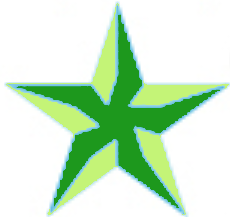






It was finally in December of 1982 through January 1983 that Paul was able to make a pilgrimage to the Arunachala mountain. By the time that he was able to travel to South India, his movements were constrained by the gradual progression of Multiple Sclerosis, and he spent hour upon hour blissfully meditating upon, painting, and drawing the majestic Holy Hill.
Seen together, Paul Saphier‘s paintings of the sacred mountain convey the ineffable joy and bliss he experienced at the foot of the Holy Hill. This was, no doubt, a turning point for him, as from then on, all his artwork gained a sense of the sacred. His spiritual and artistic paths had merged by the grace of Sri Arunachala-Ramana.
Hence, it always brings me joy to happen upon a painting in the home of a friend or in one of the ashramas in New York or Nova Scotia.
I was especially overjoyed to read the recent poem of Archisman Nair, a young man who virtually grew up in the New York ashrama in the company of his mother, and whose devotion is truly that of a ripe soul. The poem seen below and aptly named ‘Arunachala’, was inspired by one of the drawings done by Paul during his pilgrimage to the sacred mountain more than 40 years ago.
Really, who is young or old, who is here or there – are we not all who have gazed on the Holy Hill, who have experienced the bliss of Sri Bhagavan’s gaze, always and forever abiding in his all-encompassing grace?
Arunachala
Sun-soaked skies on a sun-scorched hill Radiant rays rise on a journey fulfilled Our body, heart and mind, finally still Bathed in its light, Arunachala Embodiment of the lord of destruction Center of wisdom and self-reflection Giver of peace and divine protection Curer of our plight, Arunachala
Prayer to Arunachala Ramana
Sri Arunachala Bhakta Bhagawata, founder of Arunachala Ashrama in New York and Nova Scotia, was ever absorbed in the grace of his guru, Sri Ramana Maharshi. Words of praise and surrender poured forth in an ever-flowing, seemingly endless torrent of joy, regardless of time and place. These writings continue to inspire and guide devotees to the holy feet of Arunachala Ramana, while granting solace to those who too undergo worldly trials and tribulations while treading this sacred Mountain Path. The following prayer to Sri Ramana was written during one of Sri Arunachala Bhakta Bhagawata's visits to Sri Ramanasramam.
Oh Lord Arunachala Ramana! Thou art ever abiding in the cavity of the lotus of my heart and commanding me to do nothing except remember Thee unceasingly with each and every expiration and inspiration of my breath and realize Thee once and for all. Whatever there is in the universe is soaked and saturated, permeated and pervaded and filled with Thee and there is nothing else for me to do but to drink deep in the ocean of being, consciousness and bliss that Thou are for mankind. This much I do realize that unceasing inherence in Sri Arunachala Ramana Parameshwara with devotion, dedication, submission, surrender, love and affection must remain the focal point of my earthly sojourn and with Thy infinity grace, mercy, compassion and kindness I must cling to the Self, nothing but the Self, in the innermost recesses of my heart and rise above the din and bustle of this phenomenal existence. There is not the least shadow of doubt in my mind that Thou ever holdeth me by the hand, guideth my life, lighteth my path and carrieth me onward to the Holy Hill of the Holy Beacon Light, Ramana!
With eyes closed I sit here in the Kotak House of Sri Ramanasramam and find myself absorbed in Sri Arunachala. Day and night, my heart is filled with Thy glorious and gracious presence and how I would like to do nothing but remain merged in Thy lotus feet once and for all, Bhagavan! With each and every exhalation and inhalation of my breath I find my life melted and merged in Thy unique and direct path of practice of Self-Enquiry of Who Am I? Whence Am I? And this is the destination for which Thou has brought me in to this creation of animate and inanimate beings, Arunachala! No sooner do I close my eyes, I am absorbed in the Holy Hill of the Holy Beacon Light. The time has now come that Thou taketh from me the work of resounding and reverberating the ten directions of the globe with Bhagavan Sri Ramana Maharshi ki jai!, hri Arunachaleshwara Shiva Sad-Guru Bhagavan Sri Ramana Maharshi ki jai!, and Sachchidananda Ramana Dakshinamurty Shiva Arunagiri Parameshwara ki jai! Thou ever abideth in my heart, Arunachala!
The moment Thou shone within my heart-lotus as Bhagavan Sri Arunachala Shiva Ramana Maharshi Thou made me Thy own. Since then, Thou hast always been flooding my life with Thy power and glory and there is nothing else for me to do but devote and dedicate every second of my earthly existence to the complete and total inherence in the Self in the heart-cave. In the midst of Thy deluding potency, Thou ever remindeth me not to lose sight of the goal for which this body has been given to me. With Thy infinite grace and mercy I have ever been striving strenuously to hold Thy flag higher and higher in the world so that I could prove to be the worthy son, server and servitor of the Silent Sage of Sri Arunachala Hill. At this hour, early dawn, I find myself absorbed in the Self in the cave of the lotus of my heart and beg and beseech Thee to shower Thy infinite grace, mercy, love and affection on me and make me Thy own forever, Lord Arunachala! How could I ever describe Thy power and glory with my limited capacity of expression, when the Vedas and Upanishads could not do so and retired with the cryptic statement of neti neti – not this, not this. May I ever abide in Thee. Om Sri-Ramaṇārpanam-Astu
— Oct.7, 1982, Sri Ramanasramam, South IndiaSri Ramana Sannidhi Murai
Decad of Refuge (Adaikala pathu)
280. வழிவந்த தொண்டர் வளம்பட வாழ்ந்தனர் வான்கருணை
விழிநின்று அருள்பொழி வேங்கட நாதவிவ் வெவ்வினையேன்
பழிநின்ற யாக்கையைப் பார்மேல் சுமந்து பதைபதைப்புற்று
அழிகின் றனன்உடை யாயடி யேனுன் அடைக்கலமே.
Under the compassionate grace of Your heavenly gaze, all steadfast devotees who have walked
Your path have thrived. O Venkata, I, a wretched soul burdened by this frail body and weary of
the weight of this world, trembling and fading, surrender myself at Your feet. Grant me refuge.
281. கட்குப் புலப்படும் காசினி யும்பின்ன மாக்கருத
வெட்கும் திருவடி வேங்கட நாதயிவ் வெவ்வினையேன்
கொட்கும் தெருமரல் கூட்டும் பிறவிக் கொடுங்கலியால்
உட்குவன் காணுடை யாயடி யேனுன் அடைக்கலமே.
Unable to see that this visible world is separate from the Self, I, a wretched soul, am engulfed
by the dark cloud of ignorance, cast repeatedly into this cruel ocean of suffering. In my sorrow, I
turn to You, O Venkata, and surrender at Your divine feet. Grant me refuge.
282. உஞ்சுநின் றாருனது உத்தமத் தொண்டர்கள் ஓகையிடை
விஞ்சுகின் றாரெங்கள் வேங்கட நாதவிவ் வெவ்வினையேன்
நஞ்சுநின் றுள்ளம் நடுநடுக் கெய்தி நலிதுயர்கட்கு
அஞ்சுகின் றேனுடை யாயடி யேனுன் அடைக்கலமே.

Your exalted devotees, having attained liberation, dwell in blissful contentment and joy. O
Venkata, I, a wretched soul with a heart poisoned by worldly fears and trembling amid life’s
turmoil, surrender myself at Your feet. Grant me refuge.
283. மலங்கிடல் ஆக்கும்பொய்ம் மானாபி மான மயற்கைநின்று
விலங்கினர் அன்பர்கள் வேங்கட நாதவிவ் வெவ்வினையேன்
இலங்கிய நின்கட்கு இலக்காகப் பெற்றும் இறைபணிவிட்டு
அலங்கினன் காணுடை யாயடி யேனுன் அடைக்கலமே.
Your devotees are liberated from the fabric of illusions woven by the ego’s web. O Venkata,
though graced by Your merciful glance, I, a wretched soul, have strayed from Your divine
service. I surrender myself at Your feet. Grant me refuge.
284. Having shed attachments and desires, Your devotees attained the supreme bliss and the
supreme nectar of true peace. O Venkata, I, a wretched soul, though blessed with the path
illuminated by Your guidance, have wandered astray. I surrender at Your feet. Grant me refuge.
Your devotees, having torn through the grand web of maya, that powerful veil of delusion, stand
steadfast and unwavering. O Venkata, I, a wretched soul, though blessed with the gift of Your
supreme service, have faltered at times. I surrender myself at Your feet. Grant me refuge.
286. Devotees at Your golden feet, with their unwavering patience, remain serene and untroubled by the world’s turmoil. O Venkata, blinded by the flawed vision of this worldly life, I, a wretched
soul, have filled my days with restless talk. I surrender myself at Your feet. Grant me refuge.
287. Your devotees, with minds made clear, behold You in the vastness, adorned with anklets as You
dance in divine grace. O Venkata, I, a wretched soul, though like a bee that finds honey at Your
sacred lotus feet, am left with a broken heart. I surrender myself at Your feet. Grant me refuge.
288. O Venkata, Your devoted followers, flourishing in Your boundless grace, find true awakening by
resting in the sanctuary of Your holy feet. I, a wretched soul, am lost in worldly pursuits, having
forgotten You, despite Your presence as my only divine support. I surrender myself at Your feet.
Grant me refuge.
O Venkata, embodiment of divine wisdom, You have dispelled the darkness of ignorance
clouding my mind. You, the boundless source of grace and wealth, I pray, free me from the
endless cycle of birth and death in this ocean of delusive samsara. I surrender at Your feet.
Grant me refuge.



